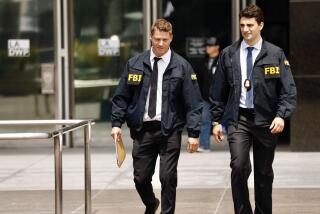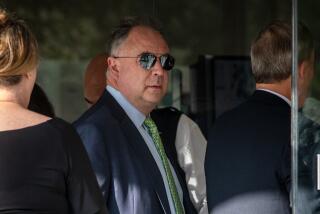Dowie Rests Fraudulent Billings Case Without Taking the Stand
- Share via
Douglas R. Dowie, a political power-broker and one-time editor of the Daily News, rested his case Tuesday without calling any witnesses to refute charges that he and a top aide at Fleishman-Hillard Inc. public relations giant conspired to defraud city taxpayers by overbilling the Department of Water and Power.
The surprise ending means that neither Dowie nor co-defendant John Stodder will testify. Stodder called two witnesses, and his lawyer said he would rest his case today.
For the record:
12:00 a.m. May 4, 2006 For The Record
Los Angeles Times Thursday May 04, 2006 Home Edition Main News Part A Page 2 National Desk 2 inches; 88 words Type of Material: Correction
Dowie trial: An article in Wednesday’s California section on the trial of Douglas R. Dowie and John Stodder Jr. on charges that they overbilled the Department of Water and Power said former Fleishman-Hillard executive Mark Barnhill had testified Tuesday. Barnhill did not take the stand; the prosecution presented the jury with e-mails written by him. The article also may have implied that Barnhill sent the e-mails while employed at Fleishman-Hillard. He sent them after leaving the firm, complaining about bills the firm had submitted to his new employer.
Since the trial began before U.S. District Judge Gary Feess on April 7, speculation has centered on whether Dowie would take the stand. A one-time confidante of former Mayor James K. Hahn, the former $330,000-a-year head of Fleishman-Hillard’s Los Angeles office raided City Hall to create a politically connected staff that brought in millions of dollars in business from the city’s water, port and airport agencies. Dowie’s testimony had been expected to cast city contracting practices in a dim light.
Dowie’s lawyers contend that subordinates padded bills without his knowledge, and Stodder said he did nothing wrong. The defense is expected to contend in closing arguments this week that government witnesses did not conclusively show the men acted with the intent to defraud the city and other clients.
Dowie’s lawyer, Thomas E. Holliday, told the court he was resting the case “based on the state of the evidence.”
Stodder’s attorney, Jan Handzlik, said outside court: “The government has failed to prove that Mr. Stodder acted with a wrongful intent.”
Fleishman-Hillard, a publicly owned firm with 80 offices worldwide, admitted wrongdoing and paid the city $6 million to cover damages from the false billings. The company also paid the city $2.25 million to settle a lawsuit over the bill padding.
Assistant U.S. Atty. Adam Kamenstein’s case featured a succession of political consultants and a blur of 1.2 million Fleishman-Hillard e-mails, which provided evidence against the executives in their own words.
Earlier Tuesday, jurors saw copies of e-mails sent by a former Fleishman-Hillard executive, Mark Barnhill, another ex-Daily News journalist, repeatedly complaining about inflated billing. At one point, he demanded in an e-mail that Dowie find someone else to handle the billing.
Another e-mail to Dowie was even more blunt. He was having trouble, Barnhill wrote, “drafting a bill that doesn’t sound like a bill of indictment.”
Barnhill testified he would push half the $300,000 bill through for payment, adding, “it’s not just the ... phony hours that set me off, it’s that they ignored my repeated entreaties to do it right.”
Later, another former agency worker said she had inflated bills to the DWP in 2003. Jennifer Laird-Manfre, who was called an unindicted co-conspirator in court papers, was called by the defense, but testified that she had “written up,” or falsified, bills at Stodder’s direction.
The phrase “write-up,” Laird-Manfre testified, was “industry vernacular for padding hours.”
More to Read
Sign up for Essential California
The most important California stories and recommendations in your inbox every morning.
You may occasionally receive promotional content from the Los Angeles Times.










